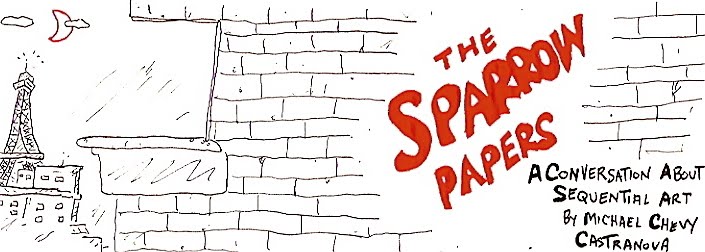 It’s been argued that as Hugo Pratt became famous, his drawing became lazy. Just look at the marvelous detail in his early work, such as The Ballad of the Salt Sea (featuring Corto Maltese’s first appearance, in 1967) and Banana Conga and the other African and Latin American stories, some critics have said. Then compare those to the loose, broad strokes of the cartoonist’s later stories, and particularly of his final books, such as Les Helvetiques and Mu: The Lost City (from 1987 and 1988 respectively).
It’s been argued that as Hugo Pratt became famous, his drawing became lazy. Just look at the marvelous detail in his early work, such as The Ballad of the Salt Sea (featuring Corto Maltese’s first appearance, in 1967) and Banana Conga and the other African and Latin American stories, some critics have said. Then compare those to the loose, broad strokes of the cartoonist’s later stories, and particularly of his final books, such as Les Helvetiques and Mu: The Lost City (from 1987 and 1988 respectively).But I think they’re wrong. While it may be true some of Pratt’s work might appear a bit hurried, his detractors overlook the mystical, surreal influence that took a stronger hold as the stories of his protagonist’s life evolved.
By the wonderful Golden Mansion of Samarkand (1980), for example, the characters do appear slightly more cartoony — and less rigid. But look at the detail in the landscape, in the ornamental paintings on the buildings. And in Tango, while Corto and Butch Cassidy might be drawn with deceptively quick strokes, see how specific everything else is rendered. Gosh, you can pick out the rivets on the street cars.
Reality is still hard-edged; the people are merely passing through. (What better way to depict characters who believe Buenos Aires is so romantic it has two moons.)
So by the time we get to the melancholic tales of Les Helvetiques — most of that Swiss adventure is a dream, after all — and Mu — the search for a mythical lost land, where practically every character except Corto dies or vanishes by the end — we and Pratt’s characters are truly disconnected from real life.
I don’t believe Pratt was taking the easy way out. Instead, he was being very, very clever.
My earlier post on Hugo Pratt and Corto Maltese can be found here.
More on Pratt, Corto, their separate adventures and Pratt’s art in future posts. And, yes, used, English-language versions of most of these books can be found (though I’m not so sure about Les Helvetiques and Mu).

No comments:
Post a Comment